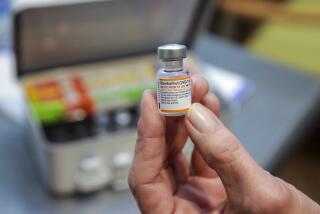Column: Are you giving your pets supplements to ward off COVID? Don’t bother
The COVID-19 pandemic has sparked a boom in consumption of dietary supplements, with one recent report estimating 12% growth in sales last year.
The fact that many people are turning to these largely unregulated products during such perilous times is one thing.
That a growing number are similarly giving them to their dogs and cats is something else.
A recent study found that sales of pet supplements soared 21% last year to nearly $800 million. Prior to the pandemic, annual sales growth was no more than 5%.
The study found that almost half of pet owners “are paying closer attention to their pets’ health and wellness because of COVID-19.”
David Sprinkle, research director for Packaged Facts, the market research firm that conducted the study, told me the big jump in sales last year reflected pet owners’ pandemic-fueled concerns about “pet immunity.”
According to the Centers for Disease Control and Prevention, a “small number” of pets worldwide have caught COVID-19 from people, but the risk of pets spreading the illness to humans “is considered to be low.”
Still, an obvious question arises: Is the spike in pet-supplement use a good thing?
I put that query to a number of specialists in veterinary nutrition, and the general consensus was “perhaps not.”
“I’m surprised by the use of supplements to protect against COVID,” said Tony Buffington, a clinical professor at the UC Davis School of Veterinary Medicine.
“I guess it is a measure of the completely understandable fear and anxiety that so many of us are feeling during this pandemic.”
That said, he told me he doesn’t recommend nutritional supplements for our furry friends “because satisfactory diets — complete, balanced, digestible, palatable and safe — don’t need them.”
Buffington noted that it’s “the responsibility of the supplement manufacturer to demonstrate the usefulness of their supplement.”
“Sadly, this is rarely done,” he said, “since it is easier to design attractive marketing strategies for what one has than learn what works.”
That’s a key point, applicable to supplements targeting both humans and animals.
Prescription drugs have to undergo multiple tests and trials before they’re approved for use by patients. Supplements, on the other hand, face little scrutiny prior to hitting store shelves.
The Food and Drug Administration typically weighs in only after a supplement is found to have violated the law — that is, after it’s put up for sale.
In one such example, supposedly drug-free supplements touting benefits for men in the, um, performance department were recalled last week after the FDA discovered they contained the same active ingredients as meds like Viagra and Cialis.
I recently asked a spokeswoman for the agency how the FDA stays on top of such things.
“Currently,” she replied, “the FDA has no systematic way of knowing what dietary supplement products are on the market, when new products are introduced or what they contain.”
I find that simply astonishing, especially when you consider that dietary supplements are a $35-billion industry. But at least there’s a government agency that’s ostensibly looking out for human consumers.
That’s not the case with critters.
Michael San Filippo, a spokesman for the American Veterinary Medical Assn., told me “the FDA does not recognize dietary supplements as a legal marketing category for animals.”
“Consequently, the quality of manufacture, safety and effectiveness of any claims made on the labels of products marketed as supplements for animals have not been reviewed by the FDA,” he said.
Moreover, San Filippo said, “there is no evidence suggesting that any supplement can protect animals” from the coronavirus or COVID-19.
Think about that. Sales of pet supplements skyrocketed last year in large part because of owners’ worries about COVID-19.
Yet according to the American Veterinary Medical Assn., there isn’t a scrap of proof these products are any better in that regard than a Milk-Bone (which, for the record, makes no COVID claims but is a most excellent dog treat).
To be sure, many supplements, such as multivitamins, are benign and pose little if any threat to consumers. But some don’t live up to manufacturers’ claims.
I wrote last year about a Los Angeles businessman named Marc Ching, whose company, Whole Leaf Organics, sold a supplement called Thrive that purportedly “treats, prevents or reduces the risk of COVID-19.”
With the Federal Trade Commission breathing down his neck, Ching agreed to stop claiming any product sold by his company “treats, prevents or reduces the risk of COVID-19; or treats cancer; or cures, mitigates or treats any disease.”
Which is to say, they’re pretty much useless for addressing specific illnesses.
When it comes to pet supplements, dog owners are much more likely than cat fanciers to try to give their pet a nutritional edge. They spend four times as much on supplements as cat owners, according to the Packaged Facts study.
Much of that spending last year went to pet supplements containing cannabidiol, or CBD, which has attracted a lot of buzz despite little evidence that it’s the miracle cure some believe it to be.
Sales of CBD pet products tripled in 2020 to just under $100 million, the study found.
“Most supplements have little to no evidence that they work,” said Joseph J. Wakshlag, a professor of veterinary nutrition at Cornell University.
“I think people are looking for ways to make their dogs healthier since we perpetuate that dog food is not enough — when in reality it is,” he said, adding that claims by makers of pet supplements are “mostly marketing.”
Julie Churchill, a professor of veterinary nutrition at the University of Minnesota, agreed that many pet owners simply don’t understand how beneficial ordinary pet food is.
“In the U.S.,” she said. “the vast majority of pet foods provide complete and balanced nutrition.”
Churchill also observed that many pet owners seem to believe that because people take supplements, there’s no harm in giving them to your dog or cat as well.
“I strongly encourage pet owners to discuss the use of supplements with their veterinarian to see if there is an indication, to get assistance in selecting a reputable brand and receive a dosage if the supplement is warranted,” she said.
As the owner of a dog and two cats, I get it. We love our panting and purring pals and want the best for them.
But they already receive all needed vitamins and minerals from most leading food brands. There’s little evidence that supplements provide any added nutritional benefits, and none that supplements can protect against COVID.
Anyone who tells you otherwise isn’t selling pet products. They’re peddling snake oil.
More to Read
Inside the business of entertainment
The Wide Shot brings you news, analysis and insights on everything from streaming wars to production — and what it all means for the future.
You may occasionally receive promotional content from the Los Angeles Times.











